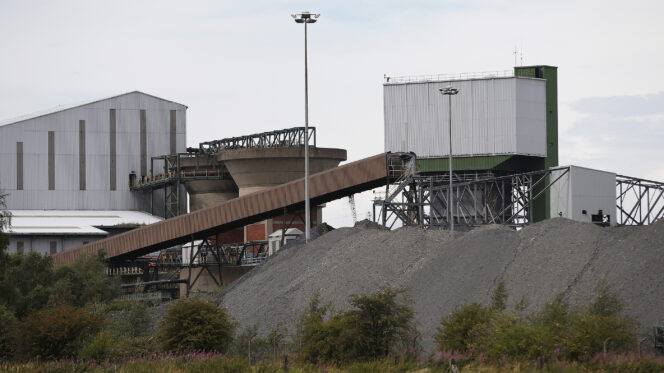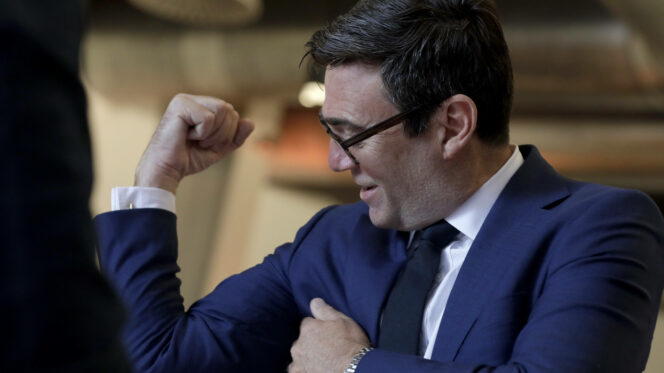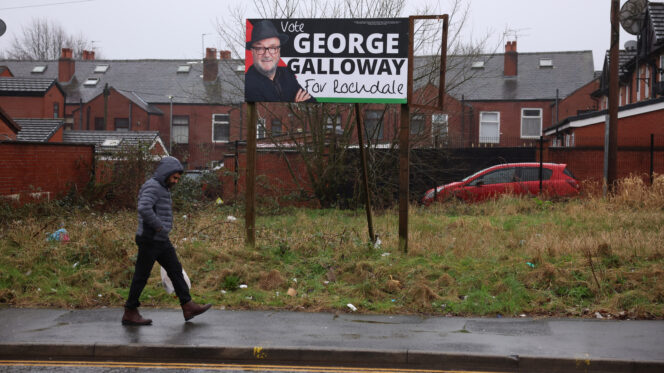Westminster Says a Mayor Could Save the North East. The North East Isn’t So Sure
Tory devolution isn’t all it’s cracked up to be.
by Moya Lothian-McLean
24 April 2024

Pigs may not fly, but two decades ago in the north east of England, a white elephant did. The giant inflatable mammal was the mascot of the ‘North East Says No’ (NESNO) campaign, masterminded in part by a young political strategist named Dominic Cummings.
Retrospectively dubbed one of the first political campaigns to tap into an “anti-politics mood”, NESNO persuaded voters to overwhelmingly reject a devolution settlement championed by deputy Labour prime minister John Prescott that sought to introduce a new layer of local governance to the area in the form of a regional assembly, like Greater London has.
20 years on, though, and devolution – the handing down of powers and responsibilities from Westminster to local administrators – is back on the agenda in the north east, this time under a Conservative government. On 2 May, voters casting their ballots for councillors in Northumberland, North Tyneside, South Tyneside, Gateshead, Sunderland and County Durham will also be asked to pick their preferred candidate for the newly created position of north east metro mayor, who will head up the first ever North East Combined Mayoral Authority (NECMA).
The NECMA covers a reduced jurisdiction compared to the regional assembly envisaged by Prescott back in 2004, and the populace living within its boundaries had very input into its terms. But its existence marks the acceleration of devolution in England – or at least the Tory iteration of it that’s been on offer since 2014 – born out of a push for ‘localism’ spearheaded by David Cameron and George Osborne. Two decades on since the people of the north east rejected New Labour devolution, their elected local politicians have signed them up to a Tory version of it. What changed?
Devolution or decentralisation?
The economy, for a start. While deindustrialisation had already made its mark by 2004, the north east was yet to suffer the successive shockwaves of austerity and Brexit. It’s now one of the poorest regions in England, with the highest levels of child poverty in the country, and unemployment rates well above the national average. Billions in funding has disappeared.
“We need to reflect on just how much [the north east] has lost in the last 15 years, when we had a regional development agency,” says Louise Kempton, professor of Urban and Regional Policy at Newcastle University.
“[The region] did have bigger geography, but the single pot budget was something in the region of £250m a year, with another £100m from European structural investment funds.”
This amounted to more than £10bn over a 30 year period; in comparison, the NECMA devolution agreement promises a total of £1.4bn to the signatory councils in the same timeframe. But 14 years of Conservative belt-tightening has left neglected English regions willing to take anything they can get. This has aided the acceleration of Tory devolution, which takes the form of deals agreed with clusters of local authorities to create what are essentially regional councils, allowing them to unlock more Westminster cash.
These deals come in three tiers, with level three including a directly elected mayor, more powers over the likes of transport policy, and more funding. It’s this settlement that 17 out of 19 current and pending devolved regions in England have plumped for – although Kempton says at this point, there’s little choice.
“I think people have realised that maybe something is better than nothing,” she tells me. “It tends to be more of a one-sided conversation: ‘Come down to Westminster, I’ll tell you what you can have.’”
Competitive funding, which pits places against each other, also sucks up time and energy while baking in a short-termist outlook. Plus, powers bestowed by central government are limited: mayors and the combined authority can’t use funding to cover anything that’s still the statutory responsibility of cash-strapped local councils, nor can they introduce policy like rent controls.
“Devolution needs to involve real autonomy over policymaking and elected government and fiscal responsibilities,” Kempton adds, pointing to France and Germany as countries with more traditional devolution and less regional economic disparity. “Anything less than that is more delegation than devolution.”
She and colleagues prefer the term decentralisation for the deals currently being thrashed out.
“That’s what we’re talking about here: decentralising certain resources and powers over certain policy areas,” she says. “But that’s not devolution.”
Mayoral money.
Decentralisation has been implemented in the north east in a piecemeal fashion, and the region is now fragmented into confusing, competing silos.
In 2014, a North East Combined Authority (with no metro mayor) was formed, made up of the seven north east councils outside the Tees Valley. In 2018, though, the local authorities for Newcastle, North Tyneside and Northumberland broke away to sign a separate mayoral devolution deal, forming the current North of Tyne Combined Mayoral Authority (NTCMA). Tees Valley also agreed a mayoral devolution settlement that year. None of the geography makes sense: for the last six years, Gateshead and Newcastle-upon-Tyne – a nine minute drive apart – have fallen under different combined authority jurisdictions.
But from May 2024, the local authorities governing these areas will be united under the single, temporarily harmonious, roof of the new NECMA. Jamie Driscoll, the current North of Tyne metro mayor, takes credit for much of the initial grunt work required to get an offer from Westminster on the table – and constituent councils to consider it in the first place. Driscoll isn’t a man who shies away from extolling (and occasionally facing criticism for inflating) his achievements as North of Tyne mayor, though others I spoke to back him up on his role in negotiating the new NECMA devolution deal.
Driscoll is also open about the limits of his devolved powers – a driving factor in lobbying for a larger combined mayoral authority. As North of Tyne mayor, his focus has been on job creation, green infrastructure and confronting poverty levels. Initiatives like a child poverty reduction programme, including breakfast clubs and specialist advice for parents on how to recover missed welfare payments, and an £18m Green New Deal Fund, for investment in low carbon projects, are among his achievements.
But against a bleak national landscape where regions further from Westminster consistently receive less, these schemes are a drop in the ocean. Driscoll knows the north east needs more money and more autonomy, and believes in grabbing the decentralisation offered by central government, limited as it is. “You’re going to have to accept that incrementalism is the only way you can get anything done,” he says.
Like many metro mayors, he’s identified transport as a key area where the devolution deals on offer do allow regional bodies to make impactful change. Exemplified by Greater Manchester’s in-progress, integrated travel network, level three devolved powers mean the new north east mayor can shape transport policy, such as reversing the privatisation of bus services. The NECMA agreement also includes commitments to updating existing train lines, and informally binds central government to funding other projects, like the Tyne and Wear Metro extension.
Driscoll sees areas like transport as a direct way to try and counteract the intense political disengagement present in the north east.
“You’d be foolhardy to think that you’re going to change the Westminster political system as a map,” says Driscoll, on rebuilding public trust in local politics.
“If you go out there and start talking about theories of government, honestly, you’re not going to get much engagement, no matter how much energy you put into it. But you start affecting people’s ability to get around, to see their mates, to get jobs, that’s when they’ll say ‘actually, this is good’.”
Politically exhausted.
It’s a mammoth task. Any candidate contesting the north east mayoralty is facing a level of political fatigue of such a scale that only 28% of the two million people eligible to vote are even aware there’s an election on 2 May. None of the local business owners, mature students or taxi drivers I spoke to across the north east knew a contest was taking place – or that some of them already live in a region covered by a mayor.
I spotted little effort to alter this state of affairs while touring the north east. Posters and flyers related to the election seemed non-existent. One Labour party activist informed us that even internal party electoral communiques to members, regarding campaigning for its candidate (current Northumbria police and crime commissioner Kim McGuinness), had been scarce.
This may be deliberate on Labour’s part. The Conservatives have almost no chance of victory, so seem to have avoided committing resources to a foregone conclusion, while it remains to be seen what sort of traction might be made by candidates from smaller parties like Reform and the Greens. The main battle appears to be between McGuinness and Driscoll, who won his North of Tyne mayorship as a Labour politician but was barred from re-selection to contest the north east position.
This decision, made on spurious grounds by Labour officials, caused “discontent” in some local constituency Labour parties, I was told, such that several have informally abstained from actively campaigning for McGuinness. Driscoll now fights the current election as an independent. One source suggested Labour’s muted approach to the contest is part of a strategy that amounts to hoping that the less attention drawn to the episode, the more favourable the outcome on 2 May.
Elsewhere, a local journalist I speak to in Durham believes the lack of public knowledge of the existing North of Tyne mayoralty could be improved by very basic methods, like adopting the sort of marketing used by Sadiq Khan and the London administration to brand their projects.
Driscoll seems sceptical of this approach, at one point in our interview ridiculing the “little EU circle” that could be found placed on European Union funded ventures pre-Brexit. Yet a small sticker goes a long way. One Newcastle hospitality entrepreneur feigned recognition when I asked if he knew there was a North of Tyne mayor. “Yes,” he said, slowly. “Asian fella?”. He was talking about Khan.
Giants among mayors.
This is another pitfall of the current devolution model. The fates of regions suddenly rest disproportionately on the shoulders of a presidential-esque figurehead. You might get a “King in the North” like Andy Burnham in Greater Manchester, one of the few genuinely popular, progressive-leaning politicians in England today (apparently feared by Labour leader Keir Starmer). Or regional electorates may be saddled with a Ben Houchen, the Tees Valley mayor and one-time Tory poster boy for “levelling up”, who has been beset by allegations of cronyism for dishing out contracts for a flagship freeport in Teesside.
Meanwhile, infighting is such between the West of England Combined Authority and its Labour mayor, Dan Norris, that the government has effectively placed the body in special measures and withheld key funding.
Yet some, like Driscoll, are optimistic that decentralisation can break the hold the two-party system has on English politics, at least at a local level. With the Tories at a historic peak of unpopularity, he predicts it won’t be long before voters lose hope in a Labour government which will seemingly embrace the same neoliberal doctrine that has guided the last 14 years of economic decline.
Driscoll believes local politics will see the rise of alternative politicians: the independents, Greens, and “sadly, the far right”.
“When these people start to get elected, that’s when you start to change the pressure [on central government],” he tells me. But pressure from where?
Democracy, now?
True, independent politicians and those standing for hyper-local parties have increased in number over the last few years. But analysis suggests these figures tend to be right-leaning populists, with plenty of former Ukip and Brexit Party councillors running under reworked banners.
As a self-proclaimed socialist politician, Driscoll is hoping to buck that trend in the north east. But most of the other sources I spoke to, both allies and opponents, were sceptical he could pull off an electoral upset.
Seizing the opportunities presented by English devolution, however limited they seem, is something the left has so far failed to do – and must address, says Alex Niven, author of The North Will Rise Again.
Niven disagrees with the devolution of power to a granular, civic level, as put forward by Starmer. Yet he believes the left needs to learn the lessons of Brexit and start answering them with a “radical regionalism” that can be realised through a “federalism-adjacent” devolution framework, as in Germany.
“I absolutely agree with the argument that is often behind these discussions of ‘progressive patriotism’ [from the left], that some form of identity, oriented around place, is important,” he says. “It’s just that I don’t think England and Englishness is the way to do it. Regionalism for me is a much better way to do that.”
Harnessing a yearning for “collectivism and a kind of positive tribalism” exemplified in part by Brexit, is key, Niven tells me.
“But if you have an identity that is just about Englishness and an English parliament, for somewhere like the north east, you’ll end up with the same, centralised sense of [being-on]-the-margins dynamics you have [now].”
For the general north east population, mostly unaware they are about to be subsumed into a new political organisation, the nuts and bolts of regionalism are currently of little concern. But even in the face of a failure to educate the electorate on the implications of devolution, related news is trickling through – and providing hope.
In Sunderland, from behind the counter of Shandiz, a Middle Eastern eatery, Zahara*, says she and her family have just made a u-turn on the decision to close the business. Shandiz has been struggling with rising running costs, post-Covid slowdown and less footfall in their area of the city, which left its owners considering whether to shut up shop.
But they’ve postponed calling it a day, thanks to a “game-changing” new film studio the family have heard is coming to the city, designed to be as big as London counterparts.
Built on former shipyard sites, Crown Works Studios is mostly backed by private investment. But as part of the NECMA devolution deal, it’s receiving £120m in government funding for its development. Around 8,500 jobs are projected to be directly created through the venture, forecast to be complete in 2027.
Zahara doesn’t know anything about any devolution deal, she tells me, but the film studio renewed her optimism.
“We [had] started thinking ‘better we close here and make a small takeaway, so we save money’. But hearing news [of the film studio] is a big hope for us.”
*Names have been changed.
To watch Novara Media’s documentary on devolution in the north east, click here.
Moya Lothian-McLean is a contributing editor at Novara Media.


